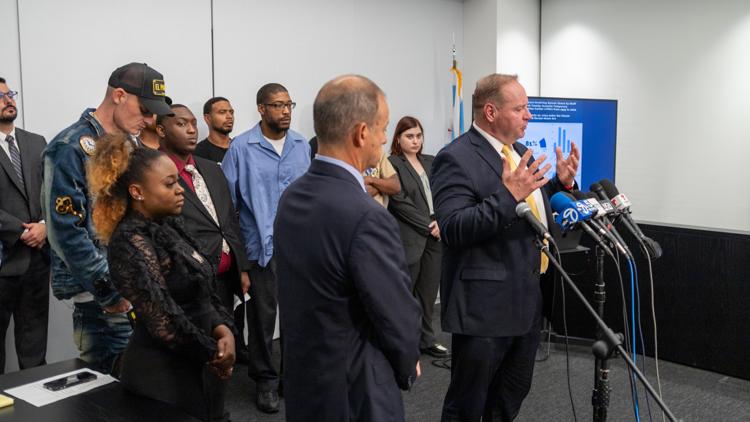CHICAGO — Two new lawsuits allege decades of sexual abuse at a Chicago juvenile detention center.
The complaints – one against Cook County and one against the state of Illinois – were filed Monday in state court on behalf of 193 men and women who were housed in the Juvenile Temporary Detention Center in Chicago, formerly known as the Arthur J. Audy Home, between 1995 and 2022.
The complaints allege jail officials “implemented systematic and unconstitutional strip searches of juvenile inmates” at the juvenile jail and that those searches “provided the opportunity” for sexual abuse of minors.
In 2008, the state took control over the JTDC and gave oversight responsibility to the Cook County Circuit Court’s chief judge following years of legal challenges surrounding conditions at the jail.
“This facility is still managed by the office of the chief judge. The state still has responsibility for this. The state has got to do something about it,” Todd Mathews, one of the lawyers working on the case, said at a Tuesday news conference announcing the lawsuits.
The lawsuits are being brought by the same firms behind a separate set of complaints filed earlier this year that detailed accounts of sexual abuse at state-run facilities.
In total, the firms have now brought complaints forward on behalf of 395 people who say they experienced abuse while in youth detention in Illinois. The law firms have also filed similar lawsuits in New York, New Jersey and Maryland.
While most of the complainants in the cases remain anonymous, some spoke to reporters on Tuesday.
“When I entered JTDC, the Audy Home, I was scared and out of place, but I hoped that I could get the help that I needed. But instead of getting help, I was preyed on and sexually abused by employees of the detention center. These were adults who swore an oath to protect young and vulnerable children,” Shamika, who requested to be identified by first name only, said at a Tuesday news conference.
Shamika was 14 at the time of her alleged abuse in 2005. She is now 33. She said what happened to her affects her “to this day.”
“I stand here for my kids and for all the girls who went through what I did,” she said. “To those girls I say: speak up, be strong and we are here to fight for you.”
These suits come after a long history of criticism surrounding youth detention in Illinois and of the Cook County facility.
In May 2022, a commission convened by Cook County Circuit Court Chief Judge Timothy Evans recommended replacing the facility with a network of smaller, “community-based” facilities.
“It is outdated and very difficult to manage,” the commission report stated. “As one staff member opined, ‘dissolution is the solution.’”
Representatives of Chief Judge Evans declined to comment on the pending litigation but pointed to recent changes at the facility.
In January, Evans’ office announced that the facility will now use body scanners – like those used in airports – to search for contraband.
That came after a 2023 state inspection report found those at the facility continued to strip search every incoming resident, despite state regulations requiring that those searches only be conducted under a “reasonable, individualized” suspicion. That report also noted that of the 1,203 strip searches conducted between October 2022 and April 2023 at the facility, zero found contraband.
In February, Evans’ office announced the circuit court received a $450,000 grant to create alternatives to youth detention and create “community centers of care.”
The funding will advance an ongoing plan backed by Evans and Cook County Board President Toni Preckwinkle to reduce the size of the jail and replace it with smaller centers focused more on rehabilitation, according to reporting from the nonpartisan news outlet Injustice Watch.
Capitol News Illinois is a nonprofit, nonpartisan news service covering state government. It is distributed to hundreds of print and broadcast outlets statewide. It is funded primarily by the Illinois Press Foundation and the Robert R. McCormick Foundation, along with major contributions from the Illinois Broadcasters Foundation and Southern Illinois Editorial Association.



